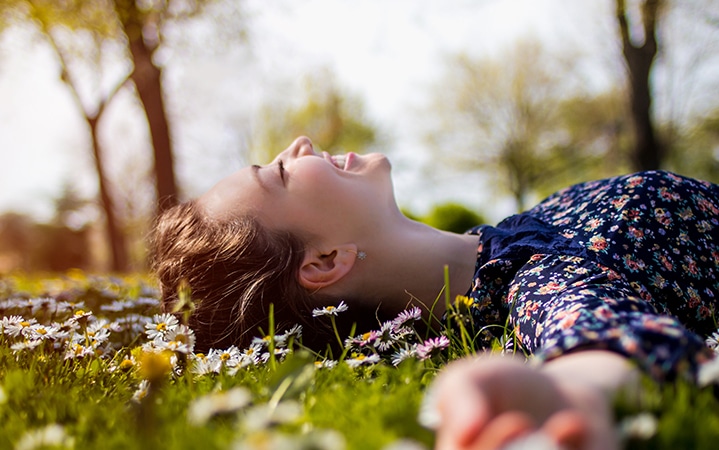
Hayfever & Allergy Symptoms
Did you know hayfever affects around 1 in 5 people in Australia?*
View RangeCauses of hayfever
Hayfever, or allergic rhinitis as it’s known in medical circles, is neither caused by hay nor results in a fever. So what does cause the itchy, runny nose, sneezing and itchy, watery eyes that can happen for a reason or a season?
The main culprits are allergens – the name given to anything that triggers an allergic reaction. These can be things that are present all year round, like dust mites, mould, or tiny flecks of skin and saliva shed by pets, or allergens only present at some times of the year, like pollen in the air during spring and summer.
Who is affected by hayfever?
Hayfever is fairly common, affecting around 1 in 5 people in Australia and New Zealand. In 2017 to 2018 statistics showed that children were less likely to have hayfever compared with people aged 15 or older.*
Hayfever often happens in people with asthma – of people with allergic rhinitis, 30% also have asthma and more than 80% of people who have allergic asthma also have allergic rhinitis. In addition, hayfever is commonly experienced by people with persistent sinus inflammation and eczema conditions.*
Is it hayfever or is it a cold?
With a lot of similar symptoms, plus the amount of colds your kids pick up and bring home, it can be a little tricky differentiating between hayfever and a cold. Here is a handy table that shows different symptoms for both. As you can see, the trick to recognising hayfever is the presence of an itchy nose and itchy, watery eyes.
| If they have: | It could be: | |
|---|---|---|
| Hay fever | Cold | |
| Itchy nose | ✓ | |
| Runny nose | ✓ | ✓ |
| Blocked nose | ✓ | ✓ |
| Itchy or watery eyes | ✓ | |
| Sneezing | ✓ | ✓ |
| Snoring | ✓ | |
| Cough | ✓ | |
| Fatigue | ✓ | |
| Headache | ✓ | |
| Sore Throat | ✓ | |
Ways to relieve hayfever symptoms
As hayfever is caused by allergens, the most obvious way to relieve symptoms is to stop exposure to the allergen. Easier said than done though, as you can’t exactly hide inside for all of spring and summer, or get rid of a beloved family pet! So in addition to reducing exposure as much as reasonably possible, you might need to look elsewhere for relief of your symptoms.
Medication options include antihistamines (either taken orally, or as eye drops or nasal sprays), corticosteroid nose sprays and decongestants. Antihistamines help reduce symptoms like sneezing and itchy eyes, but only some formulations help with a runny or blocked nose. Nose sprays containing corticosteroids can help reduce inflammation, as long as they are used correctly and regularly. Decongestants in medicines and nasal sprays work to unblock and clear the nose.
If you or your family suffers from hayfever symptoms, you’ll find relief in the Demazin range of products for the whole family (from the age of 6+). Have Demazin handy in preparation of allergy season, or to help when allergens cannot be avoided.
*Australasian Society of Clinical Immunology and Allergy (ASCIA). Allergic rhinitis (hayfever). 2019. Available at: https://www.allergy.org.au/images/pcc/ASCIA_PCC_Allergic_Rhinitis_2019.pdf (accessed 25/08/20).
View RangeFrequently asked questions about hayfever symptoms
Demazin Allergy + Hayfever Relief Tablets contain an ingredient to help manage the symptoms of hayfever. Other products in the Demazin range that contain both a decongestant and an antihistamine are: Demazin 12 Hour Nasal Decongestant Spray, Demazin Cold + Flu Relief Day + Night Tablets, Demazin Kids 6+ Cold Relief Colour Free Syrup, Demazin Kids 6+ Cold Relief Blue Syrup and Demazin Kids 6+ Cough + Cold Relief Syrup, while Demazin Cold + Flu Relief Tablets contain a decongestant for blocked or runny noses.
Medications cannot cure hayfever, but they can reduce symptoms and make your life a little easier.
In Australia, fewer children experienced hayfever symptoms than adults between 2017 and 2018 (the latest available data).
Yes – if the allergen that triggers your hayfever is seasonal (like pollen) or only in certain locations (like mould) then symptoms will appear when you’re exposed to the allergen and go away once you get away from it.
Your hayfever will be worse when you are exposed to whatever is triggering the allergic reaction, so pay attention to when your symptoms are better or worse if you are not sure what may be triggering them.
